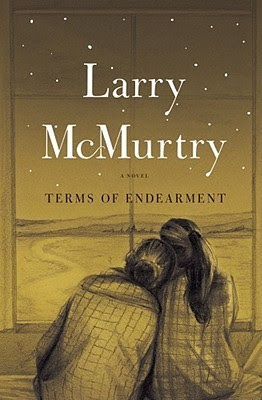I have been
a fan of McMurty since his novel LonesomeDove was made into a TV mini-series.
After watching that epic western, I immediately went to the library and
read the book as well as several other McMurty novels. His novels are either set in the days of Old
West or contemporary Texas. His
characters are certainly memorable, as you may know if you’ve ever read any of
his novels or seen movies based on his work.
 Terms of Endearment takes place in modern Houston, TX
and though there are both male and female leads, women characters are
highlighted in this book. In the books’
preface McMurty states, “Though often praised for my insights into women, I’m
still far from sure that I know what women are like; but if my hunches are
anywhere near accurate, and I’m not idealizing her, then Emma is what women are
at their best.” Aurora is the widowed mother
of newly married and pregnant Emma, and as the story begins they are having a
conversation about marriage. Right away
I was intrigued by McMurty’s feminine portrayal and perception. Aurora is “larger than life” with several men
who wish to win her heart. Emma is
coming to terms with her life as wife and mother. The two have an ongoing love/hate
relationship, and while reading I was either laughing hysterically or reaching
for a box of Kleenex. Aurora’s
housekeeper, Rosie, also plays a lead role and her life adds another
perspective as she deals with an unfaithful husband.
Terms of Endearment takes place in modern Houston, TX
and though there are both male and female leads, women characters are
highlighted in this book. In the books’
preface McMurty states, “Though often praised for my insights into women, I’m
still far from sure that I know what women are like; but if my hunches are
anywhere near accurate, and I’m not idealizing her, then Emma is what women are
at their best.” Aurora is the widowed mother
of newly married and pregnant Emma, and as the story begins they are having a
conversation about marriage. Right away
I was intrigued by McMurty’s feminine portrayal and perception. Aurora is “larger than life” with several men
who wish to win her heart. Emma is
coming to terms with her life as wife and mother. The two have an ongoing love/hate
relationship, and while reading I was either laughing hysterically or reaching
for a box of Kleenex. Aurora’s
housekeeper, Rosie, also plays a lead role and her life adds another
perspective as she deals with an unfaithful husband.
In
considering the title one might first think of pet names, such as “baby,” “honey,” “dear,” or even “sweet-pea.” In fact the title’s phrase only appears once
near the story’s end and dialogue never seemed to include excessive
flattery. This observation got me
thinking more about terms as in the basis of a condition, or taking a
position. What exactly were Aurora’s
terms when giving her suitors an ultimatum, or Emma and Rosie’s terms when
dealing with their husbands? These
strong females dealt with a lot of craziness and even though there were times
they felt beaten down by the men in their lives, they always ended up with set
limits to their affections. I’m sure
there will be a lively discussion when we meet to analyze this book.
No comments:
Post a Comment